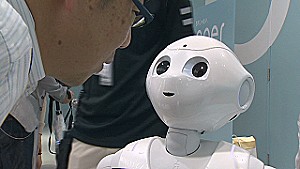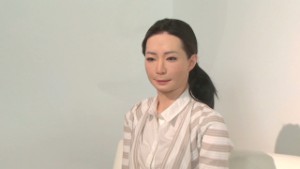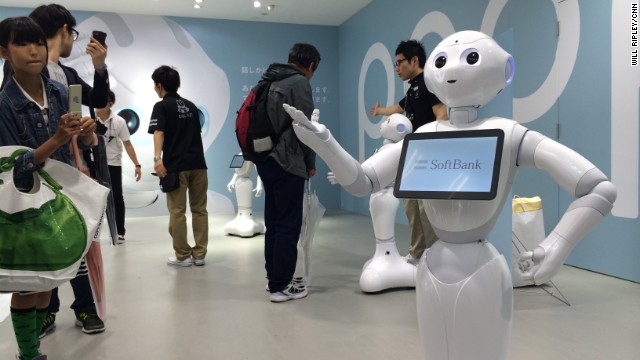As Japan's population ages, robots seen as workforce solution.
A crowd gathers near the entrance of Tokyo's upscale Mitsukoshi Department Store, which traces its roots to a kimono shop in the late 17th century.Fitting with the store's history, the new greeter wears a traditional Japanese kimono while delivering information to the growing crowd, whose expressions vary from amusement to bewilderment.
It's hard to imagine the store's founders in the late 1600's could have imagined this kind of employee.That's because the greeter is not a human -- it's a robot.
Aiko Chihira is an android manufactured by Toshiba, designed to look and move like a real person. It was put on temporary display at the department store.
Toshiba says Chihira has 43 motors allowing it to move, speak in sign language and even sing.The regular greeter, Ayako Seiryu, says she's not worried about a robot replacing her -- even one made to resemble a real 32-year-old woman.
"Communication is important," she says. "My strength is I can actually talk to people."
Chihira can't have a conversation yet, acknowledges Hitoshi Tokuda, Toshiba spokesperson. But he says the technology is evolving quickly and someday, robots like Chihira could replace humans for certain jobs.
Robots in the workforce?


A growing number of Japanese businesses are testing out robots as a possible solution to the country's shrinking workforce.They're appearing in stores, banks and soon even hotels.
Bank of Tokyo-Mitsubishi UFJ is trying out "Nao," a customer service robot that answers basic questions and is designed to speak 19 languages. The robotic polygot could prove useful serving foreign customers during the 2020 Tokyo Olympics.
By then, the bank hopes to have even more robots on staff."Pepper" is a humanoid robot that "chats" with customers. A humanoid has human-like characteristics such as arms, legs and a head -- but is designed to look like a robot. Pepper first began appearing in Tokyo stores last year.
Manufacturer Softbank hopes it'll eventually be a "family robot," like a sleeker version of Rosie on "The Jetsons."
Meet Pepper -- the world's first emo robot
A hotel scheduled to open at Huis Ten Bosch theme park in Nagasaki this summer plans to have 10 robot staff members and aims to increase that to more than 90% of hotel services operated by robots.
Today's novelty could be tomorrow's necessity. Japan has an aging population that has prompted serious talks about how to incorporate robots into the nation's shrinking workforce.
One group that seems willing to embrace robots are Japan's senior citizens.A survey by nursing home operator Orix Living found more seniors would feel comfortable being cared for by a robot than a foreign nurse.
In a nation with a dwindling population, waning workforce, and deep resistance to immigration, it seems robots will only play a larger role in Japan's future.
News Courtesy: www.cnn.co











